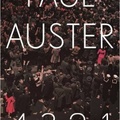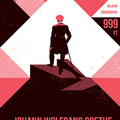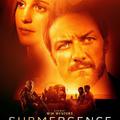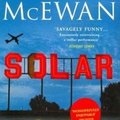Wendy Holden: Fame Fatale
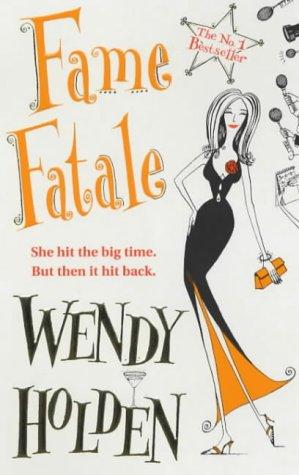
One of my blogger acquaintances mentioned that this novel features a lot of witty literary jokes and sarcastic remarks, and I happen to like things like this so I quickly got hold of the novel and read it. Well, in fact, I wasn’t that quick with the reading, because around halfway through the story I started to get bored big-time, and afterwards I could only muster so much interest as to read the rest of the novel at the rate of about 30 pages/day.
Which is a pity, since Fame Fatale starts off as a rather good and definitely very entertaining novel. One of the protagonists, Grace works at a small publishing house (called Hatto & Hatto – and I would guess it’s not an accident that the name reminds one of the Chatto & Windus publishing house) which specializes in authors about whom no-one cares in the whole world. Grace is responsible for the marketing of the absolutely uninteresting writers, and at the beginning of the novel it seems that everything’s going rather well: one of their authors, Henry Moon is even invited to a renowned literary festival – however, it soon turns out that the invitation was a mistake, since the organizers of the festival assumed for some reason that Moon’s travelogue, Sucking Stones was some scandalous book about the groupies of the Rolling Stones. Anyway, Grace and Henry strike up something like an affair at the festival, but, sadly, Grace already has a boyfriend, and this complicates matters a bit.
In the other plot line we follow Belinda Black, the self-appointed star journalist of a tabloid, whose main goal in life is to arrange an interview with a male superstar (it doesn’t really matter which one) and then make him marry her. Surprisingly, however, the superstars are not exactly keen on being interviewed by a bitchy hack who lacks any kind of journalistic skills and work ethics whatsoever, therefore Belinda needs to resort to some tricks to achieve her goal.
Like I said, Fame Fatale starts well. Wendy Holden has quite a lot of really funny jokes and witticisms up her sleeve (besides a couple of tasteless ones), and she makes fun of the world of publishing houses, editors, literary figures and tabloid papers very cleverly. For instance, we can learn from this book how marketing directors pick those review quotes which will appear on the book covers; how certain editors deal with manuscripts; and how TV channels recruit the audience for the shooting of certain TV talk-shows.
And this nicely satirical, light side of the novel is really good and massively entertaining. However, Holden seems to lose her satirical sense after about the first half of the novel, and the book becomes boring: the story ceases to hold any interest, the jokes are not funny anymore and anyway, Holden repeats the same jokes over and over again, and the major plot turns can be guessed at 50 pages before they actually happen – which is not so good in the case of an action-driven, more or less romantic novel like this. So in the end, even though several characters are very likeable or funny (e.g. Henry Moon, the unpopular author who stoically accepts all his failures in the fashionable literary life is a likeable and interesting character), after about 200 pages of messing around I could no longer care for any characters at all, and I was only looking forward to finally reaching the last page.
Which is a pity, since Fame Fatale starts off as a rather good and definitely very entertaining novel. One of the protagonists, Grace works at a small publishing house (called Hatto & Hatto – and I would guess it’s not an accident that the name reminds one of the Chatto & Windus publishing house) which specializes in authors about whom no-one cares in the whole world. Grace is responsible for the marketing of the absolutely uninteresting writers, and at the beginning of the novel it seems that everything’s going rather well: one of their authors, Henry Moon is even invited to a renowned literary festival – however, it soon turns out that the invitation was a mistake, since the organizers of the festival assumed for some reason that Moon’s travelogue, Sucking Stones was some scandalous book about the groupies of the Rolling Stones. Anyway, Grace and Henry strike up something like an affair at the festival, but, sadly, Grace already has a boyfriend, and this complicates matters a bit.
In the other plot line we follow Belinda Black, the self-appointed star journalist of a tabloid, whose main goal in life is to arrange an interview with a male superstar (it doesn’t really matter which one) and then make him marry her. Surprisingly, however, the superstars are not exactly keen on being interviewed by a bitchy hack who lacks any kind of journalistic skills and work ethics whatsoever, therefore Belinda needs to resort to some tricks to achieve her goal.
Like I said, Fame Fatale starts well. Wendy Holden has quite a lot of really funny jokes and witticisms up her sleeve (besides a couple of tasteless ones), and she makes fun of the world of publishing houses, editors, literary figures and tabloid papers very cleverly. For instance, we can learn from this book how marketing directors pick those review quotes which will appear on the book covers; how certain editors deal with manuscripts; and how TV channels recruit the audience for the shooting of certain TV talk-shows.
And this nicely satirical, light side of the novel is really good and massively entertaining. However, Holden seems to lose her satirical sense after about the first half of the novel, and the book becomes boring: the story ceases to hold any interest, the jokes are not funny anymore and anyway, Holden repeats the same jokes over and over again, and the major plot turns can be guessed at 50 pages before they actually happen – which is not so good in the case of an action-driven, more or less romantic novel like this. So in the end, even though several characters are very likeable or funny (e.g. Henry Moon, the unpopular author who stoically accepts all his failures in the fashionable literary life is a likeable and interesting character), after about 200 pages of messing around I could no longer care for any characters at all, and I was only looking forward to finally reaching the last page.

